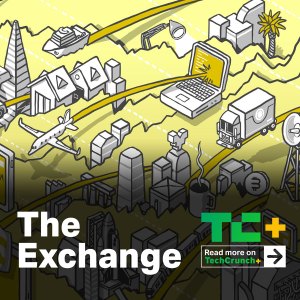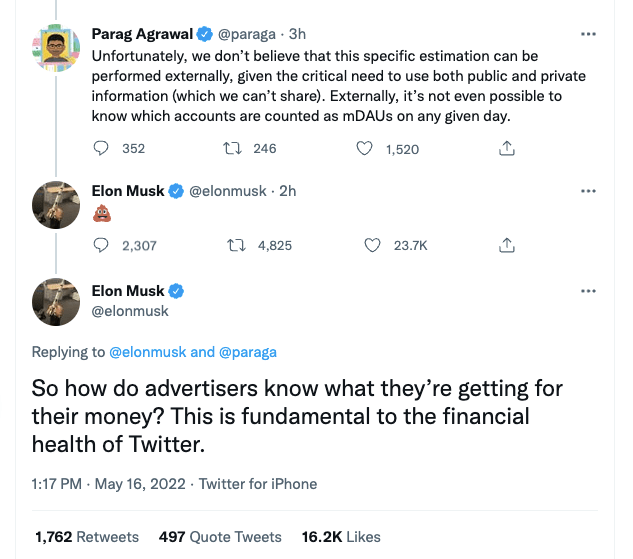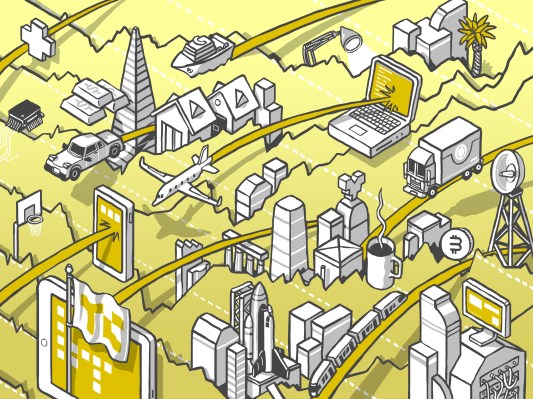When The New York Times got its hands on some of Elon Musk’s plans for Twitter, a company that he is in the process of purchasing, you would have been forgiven for thinking that Musk knew what he was buying.
Per the Times’ reporting, we learned that Musk expects to bolster Twitter’s revenue to “$26.4 billion by 2028, up from $5 billion last year,” while growing the company’s user base from “217 million at the end of last year to nearly 600 million in 2025 and 931 million six years from now,” boosting average revenue per user by nearly $6 over the same time frame.
The Exchange explores startups, markets and money.
Read it every morning on TechCrunch+ or get The Exchange newsletter every Saturday.
Those numbers might have made SPACs blush, but they showed something critical in the Musk pitch: That Twitter had huge amounts of value that he, Musk, could unlock with his plan.
 Since then — the Times broke the Musk investor pitch 11 days ago — matters between Musk and the social media company have become tenuous as its potential acquirer took to the company’s service to complain, prod and backtrack.
Since then — the Times broke the Musk investor pitch 11 days ago — matters between Musk and the social media company have become tenuous as its potential acquirer took to the company’s service to complain, prod and backtrack.
Musk’s displeasure with Twitter has centered around the issue of bots. Not all bots on Twitter are malicious or bad; some are even entertaining. But too many bots, or even the wrong sort, matter because they can dilute the user experience on the social service by spamming real users and inflate the company’s advertiser-focused metrics.
On May 13, Musk threw the financial world into a frenzy by stating on Twitter that his deal to buy the company was “on hold pending details supporting calculation that spam/fake accounts do indeed represent less than 5% of users.” Whether he was able to make such a decision is not clear based on the deal documents.
Although he said he was still “committed” to the deal, Musk ran an experiment involving a set of 100 users to see how many were bots.
He added that he “picked 100 as the sample size number, because that is what Twitter uses to calculate <5% fake/spam/duplicate.” Then, in a tweet on May 14, he revealed that Twitter “just called to complain that [he] violated their NDA by revealing the bot check sample size is 100!”
“This actually happened,” he added. TechCrunch covered the event at the time.
Since then, things have only become more complicated. Musk took to Twitter again on the 14th to state that “[w]hoever thought owning the libs would be cheap never tried to acquire a social media company!”
That was hardly the end. In response to the various Musk complaints about Twitter and its potential bot issue, the company’s CEO, Parag Agrawal, posted a thread discussing the company’s approach to spam, bots and managing both. Musk weighed in with typical eloquence:

This comes from the man who put together a $44 billion pitch for Twitter, is under a nondisclosure agreement and has lined up quite a lot of funding for the sale. It’s confusing — did Musk not know the details of the company that he is putting up a portion of his personal wealth, along with dollars from friends and others, to buy?
Earlier this morning, Musk said the social media platform may have “20% fake/spam accounts,” which “while 4 times what Twitter claims, could be much higher” in reality. The potential Twitter buyer added that his offer to buy Twitter was based on the social media company’s “SEC filings being accurate.”
Musk said that the deal “cannot move forward” until Twitter’s CEO shows proof of the company’s bot metrics. So as of this morning, the Twitter-Musk deal is on hold. Under normal circumstances, we’d say that the deal is set and that terms are in place for potential breakups and other possible situations. But we’re talking about Elon Musk, who has shown that the rules don’t always apply to the super wealthy.
Does Musk even want to buy Twitter anymore?
Speculation, ironically on Twitter, is rampant that Musk wants out of the deal — which is not a huge leap as he has tweeted that the transaction is on hold — and is looking for an escape ramp. That may be the case, and he may have decided that Twitter is not worth the dollar amount he put on it. Or, it may have simply become too much of a bother.
Twitter is far from perfect. Buying it would be a huge responsibility, not only to its employees, shareholders and users, but also because of its place in the global conversation. Twitter deals with hostile foreign governments, misinformation and other matters that are sticky. User moderation is no easy game, so much so that even the “free speech” Twitter clones in the market have terms of service that ban certain activity.
Buying Twitter would be an expensive headache for anyone, let alone someone already running two other companies in different industries.
The fact that Musk is open and transparent is a good thing that is easy to applaud. However, when he’s an ass in public, it’s less welcome. And as he tunes up the snark to the detriment of the current leadership of the very company he is trying to buy, it seems unserious, unfocused and counterproductive — not the sort of image you want to project if you are marshaling tens of billions of dollars to take a public company private.
You don’t want to state out loud, after you agree on a price, that the asset you are buying might in fact be less valuable than you anticipated.
Unless you want out? Or want to somehow negotiate a lower price? We’ll let the legal folks sort out how easy — and how expensive — it would be for Musk to bow out. But for now, the deal is on, even though Musk seems less than thrilled about the fact.
